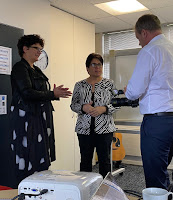With COVID being at the forefront of the current media cycle, school leaders have been contacted to seek comment around the Government and Ministries of Health and Education's handling of the pandemic within a school setting. I was contacted by a journalist from ONEnews to comment on the disruption, barriers and concerns I was facing as a school leader during COVID. Being inexperienced in working with media, I was reluctant to make a comment, so gave a very general apology for being very busy in managing our pandemic plan so was unavailable for an interview. Whew...dodged that interview but this highlighted for me the need to be prepared if a brush with the media ever did eventuate. So after seeking some advice from my BP mentor I was guided to Mr Pete Burdon, media consultant. I sought his course outline and costings and then shared the information with three other principals in my CoL and proceeded to engage his services for an in-house media workshop.
It was an intense course where we were given a variety of scenarios and were filmed carrying out dummy interviews. I appreciated the opportunity to review each interview, all the while unpacking and highlighting aspects of my responses I could improve on or in some cases avoid all together. Doing the interviews with my fellow principals gave us a shared understanding of interview techniques, and insight into what reporters may be looking for and how they may take your responses and rework them possibly to your detriment.
My biggest takeout from the day was unquestionably the three 'R's - Regret - Respond - Reassure.
REGRET - without apologising/saying sorry which indicates blame, show regret for the scenario/situation and understanding for how the 'wronged' party may be feeling.
RESPOND - indicate how you/the school/the board intend to correct the situation, what will be put in place, actions to be undertaken.
 REASSURE - give parties reassurance that measures are being put in place, the situation is being delt with and that health/safety/security is paramount in our minds for our students/staff/whanau/community.
REASSURE - give parties reassurance that measures are being put in place, the situation is being delt with and that health/safety/security is paramount in our minds for our students/staff/whanau/community.Keeping a level head, giving an initial general response in order to create breathing space for developing amore concise, thoughtful and accurate reply is important to avoid serious fallout. It's also important to seek help from advisers when unsure or not confident. If you're ever in a situation where media seek comment or show interest, it's not beneficial to try to put interviews off completely as that could give the media opportunity to mould the story. It's better to get in front of the story and steer your narrative than give media range to modify or sensationalise aspects of it.
This was a workshop definitely worth taking and the learning is something myself and my team of principals will continue to revisit and practice.










